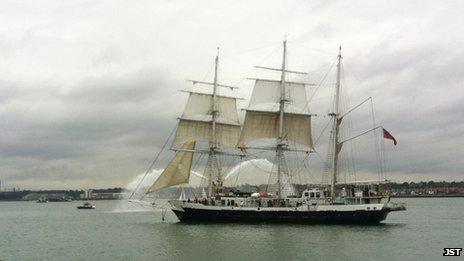Tallship Lord Nelson sets sail on round-the-world voyage
- Published

The Lord Nelson was designed and built to be sailed by people of all physical disabilities
A tallship with a disabled crew has set off on a 50,000-mile voyage around the globe.
The Jubilee Sailing Trust (JST) ship Lord Nelson left Southampton on Trafalgar Day.
A crew of 50 people, of mixed physical abilities, including wheelchair users, will sail the ship on the two-year voyage.
The ship was escorted by a flotilla of other sailing vessels down Southampton water.
It set sail for Rio de Janeiro at 11:50 BST, the time that Admiral Lord Nelson hoisted his final flag signal to the fleet at Trafalgar to "set all sails possible with safety to the mast".
Scrubbing the deck
The ship was designed and built to be sailed by people of all physical abilities, working side-by-side.
It was named after "Britain's most famous disabled sailor", the JST said
Beryl Jones, a retired disability adviser from Anglesey in Wales, who has multiple sclerosis, was on board.
She said: "My grandfather was a sea captain who sailed the world and I guess at this late stage in my life I am following in his footsteps.
"This sail will provide adventure, involving almost every activity on board. Scrubbing the deck and potatoes, washing dishes, setting the sails, keeping watch and peering from the crow's nest - a thrill of a lifetime."
The project, called the Norton Rose Sail the World Challenge, will be completed in 10 main ocean passages, which will take up to two months each.
The first leg is from Southampton, across the Atlantic, to Rio de Janeiro, from where the ship will set sail for Cape Town in South Africa.

The crew of 50 will change for each of the 10 main ocean passages
It will visit 30 countries and all seven continents and each passage will be completed by a different crew.
Alex Lochrane, JST chief executive, said: "This is no pleasure cruise - our crew will be working together to guide Lord Nelson across the Atlantic and then around the world.
"We are delighted to be able to give both disabled and able-bodied people the opportunity to take on massive challenges and push their boundaries."
- Published2 August 2012